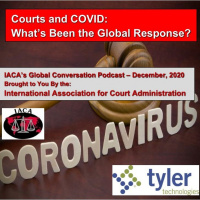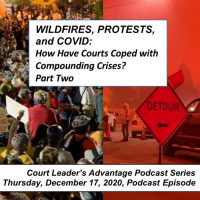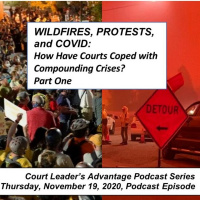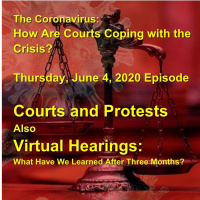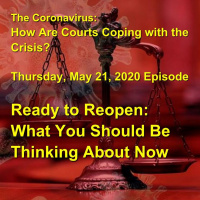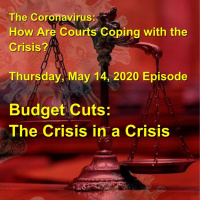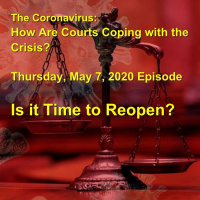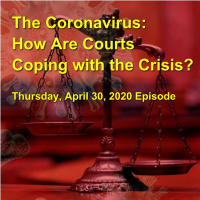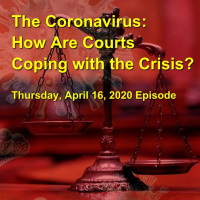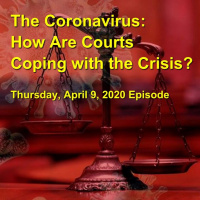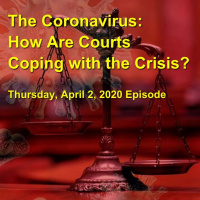Sinopsis
Coming innovations, thought-provoking trends, questions that matter to the court community, these and more themes are covered by the Court Leaders Advantage podcast series, a forum by court professionals for court professionals to share experiences and lessons learned.
Episodios
-
The Courts and COVID: What's Been the Global Response?
29/12/2020 Duración: 41minIACA’s Global Conversation Podcast, Thursday, December 31, 2020 Brought to You By the: International Association for Court Administration The Coronavirus pandemic has been a scourge across the globe. It has also been one of the longest lasting and most widespread crises in recent times. It has affected every component of government in every nation that has had to deal with COVID-19. How have court systems in different countries coped with the pandemic? This podcast asks court leaders from around the world about issues important to the administration of justice. This episode will explore how courts around the globe have responded to the Coronavirus. About the Co-Hosts: Janet Cornell has over 35 years in court leadership including service in general and limited jurisdiction courts. She is a founding and contributing member to www.courtleader.net. She has a Masters in Public Administration from Arizona State University, Tempe, AZ, and is a Fellow of the National Center for State Courts, Institute for Court
-
Wildfires, Protests, and COVID: How Have Courts Coped with Compounding Crises? Part Two
16/12/2020 Duración: 35minThursday, December 17, 2020, Court Leader's Advantage Podcast Episode Part two of a conversation with our panel of court administrators whose courts have endured multiple concurrent crises. They had to deal with questions of allowing protestors into the courthouse because it is a public building while worrying about vandalism. They struggled to maintain a semblance of an operation with courthouses that were closed for months at a time. They had to keep air circulation open to eliminate the Coronavirus yet close the vents to prevent breathing in wildfire smoke. We have so much to learn from their solutions they crafted. What did they and their courts have to go through? How are they modifying their future contingency plans? What can we learn from what they have had to endure? About My Co-Host: Alyce Roberts is recently retired as Special Projects Coordinator for the Alaska Court System. Alyce is a 2010 Fellow of the Institute for Court Management. About Our Speaker Panelists: Our panel includes administr
-
Wildfires, Protests, and COVID: How Have Courts Coped with Compounding Crises? Part One
23/11/2020 Duración: 33minThursday, November 19, 2020, Podcast Episode Unbelievably, the expression “we are living in unprecedented times” has become a cliché. Since early 2020, so much has happened to us, so quickly, and with so little warning that the only response anyone seems to have is “Well, now what?” Still, because so many extraordinary events have occurred this year, 2020 has much to teach us. We are talking with court administrators whose courts have endured nightly violent demonstrations that have lasted for months, wildfires that have turned day to night and made the air unbreathable and, of course, the Coronavirus. This is part one of two episodes where our panel shares the lessons they have experienced first-hand. What can we learn from the experiences of these courageous court administrators, their staffs, and their courts? How will they update their Continuity of Operations Plans? What advice do they have for the rest of us? About My Co-Host: Alyce Roberts is recently retired as Special Projects Coordinator for t
-
Court Professionals and Protests: What Should You Be Thinking About Now? Bonus Episode from the July 2020 Podcast
17/11/2020 Duración: 16minOur July Court Leader’s Advantage video podcast episode on courts and protest marches has garnered considerable interest. Over 300 viewers have accessed the episode. Among those who watched the episode was Norman Meyer, Retired Clerk of the U.S. Bankruptcy Court for the District of New Mexico, who wrote in two questions to ask about court employees, protest marches, our first amendment rights, and the NACM Model Code of Conduct. Norman joins the episode to ask his two questions. About the Guest Speaker: Norman Meyer retired after serving for 38 years as a court administrator in both the state and Federal systems. Most recently, he was Clerk of the United States Bankruptcy Court for the District of New Mexico. He is a court administration expert after a 38 year career as a trial court administrator in the state and federal U.S. courts. He has written and spoken widely on judicial administration in the United States and abroad, and is currently writing a court management blog (https://courtlea
-
Diversity and Inclusion: Why Is It Even More Important Now? Part Two
15/10/2020 Duración: 46minFor decades we court professionals have committed ourselves to the practice diversity and inclusion. We make this commitment to earn the public’s trust and confidence in our nation’s courts. This dedication is ongoing; the work still continues. The goals of diversity and inclusion affirm our pledge to fairness, equity, impartiality, trust, and accountability. They also enhance decision-making, innovation, resiliency, responsiveness, employee engagement, and the delivery of services. Courts are constantly confronted by the demand for more access, the desire for equality, and the erosion of that very public trust and confidence we have pledged to earn. What can we do to strengthen our core values? What can we do to use diversity and inclusion as a way to solve today’s problems? What do we see on the horizon for courts as they struggle to address these issues every day? About the Co-Host: Zenell Brown Zenell Brown, Executive Court Administrator for the Third Circuit Court in Detroit, Michigan. She received
-
Diversity and Inclusion: Why Is It Even More Important Now? Part One
17/09/2020 Duración: 40minOver the last forty years, our nation’s courts have been committed to diversity and inclusion, in order to live up to the ideals of fairness and equality, and to build public trust and confidence. While we can point to many improvements, there is still much work to be done. The lessons learned from diversity and inclusion practices point to benefits beyond just furthering the institutional values of fairness, equity, impartiality, trust, and accountability. They also improve decision-making, innovation, resiliency, responsiveness, employee engagement, and delivery of services. Institutions like courts today are challenged by the spread of global pandemics, the demand for more access, the desire for more equitable outcomes, and the erosion of public trust and confidence in government. Diversity and inclusion should be at the forefront to harness new solutions and to turn challenges into opportunities. What can we do to strengthen our institutional values and apply concrete diversity and inclusion practices to
-
The Coronavirus: How are Courts Coping with the Crisis? Thursday, June 25, 2020 Episode:
24/06/2020 Duración: 41minCOOPs and the Coronavirus: The Lessons May Surprise You Courts are now in the midst of reopening, yet the Coronavirus is still very much with us. Right now, the United States has had over 2.3 million confirmed cases with over 26,000 new cases reported just yesterday. We have experienced 121,000 deaths from the virus and new projections predict that we will top 200,000 by the fall. In over a third of the country, the infection rate is actually increasing. This alone makes this crisis different from any courts have ever faced before. If it were a hurricane, a tornado, or an earthquake, within a few hours to a few days, it would be over; efforts would turn to clean up and repair. We still cannot do that yet, even though the country is working hard to return to normal. Nevertheless, this seems like a good time to look back and take stock of what we have learned so far from the crisis, and what we would change in our Continuity of Operations Plans (COOP). This week the panel discusses the need for long-term COOP r
-
The Coronavirus: How are Courts Coping with the Crisis? Thursday, June 18, 2020 Episode:
17/06/2020 Duración: 28minYour Court Restarting Trials? Here’s What Works As courts are reopening, many have already held their first trials. Others are planning to start trials in the next month or two. Whether they are conducted in-courtroom, or via video conference-calls, trials are going to look different for some time into the future. What will change for those coming to the courthouse? What will a trial on a video conference-call look like? To help manage this process, The Federal Judiciary just released a report on June 4 titled, “Conducting Jury Trials and Convening Grand Juries During the Pandemic.” The panel discusses the experience of courts that have already held some trials; others courts that are starting up pilot programs in their states; the dramatic increase in the space needs for jury trials (it is currently taking three courtrooms to hold a single trial); supplemental jury questionnaires specifically addressing jurors and the Coronavirus; masks, goggles, and gloves, disinfecting routines; videos describing what cour
-
The Coronavirus: How are Courts Coping with the Crisis? Thursday, June 11, 2020 Episode
10/06/2020 Duración: 36minBudget Strategies: What Have We Learned from the Lockdown? About three weeks ago, May 14, 2020, the financial crisis was looming, but the details were still vague. Since then several courts have been forced to begin budget cuts that have included layoffs and furloughs. Yet even now all we can say about the national situation is, it remains fluid. Dread over the upcoming economic statistics turned to excitement on Friday, June 5th as the unemployment numbers were better than expected. Still, unemployment remains well above the highest numbers seen during the 2008 recession. What do we know now after several weeks have gone by? Have courts adapted their plans to the changing economic situation? This week panelists are asked a question by listener Jeff Barlow on the difference between the “thin the soup” and the “ration the soup” strategies for court budget reductions. The panel also talks about how to manage through layoffs and employee furloughs; charging for establishing time payment schedules; extending thos
-
The Coronavirus: How are Courts Coping with the Crisis? Thursday, June 4, 2020 Episode:
03/06/2020 Duración: 29minCourts and Protest! also Virtual Hearings: What Have We Learned After Three Months? The events that have transpired since late February of this year defy classification. · A pandemic the likes of which this country has not seen since the 1918 Spanish flu · Unemployment numbers that rival the 1929 Great Depression · Now protests and riots in dozens of American cities sparked by the killing of an unarmed African-American man in Minneapolis. Protests and the Courts This episode was to focus on virtual hearings, and we will still discuss this topic, yet it is vital that we acknowledge the events of the last week during this episode. Virtual Hearings Most courts now have experienced about three months using virtual hearings on an extensive scale. This is a good time to explore some of the everyday topics that concern expanding the use of this innovation. The panel discusses public access to virtual hearings, security, ease of use, handling private attorney-client sidebars, making the record, and situations where o
-
The Coronavirus: How are Courts Coping with the Crisis? Thursday, May 28, 2020 Episode:
28/05/2020 Duración: 32minWhat Will the Courthouse of the Future Look Like? As more courts reopen many practical problems are emerging. How to social distance in courthouses and courtrooms that are ill-equipped for this kind of crisis? What kinds of traffic and crowd management tools are available? What will courthouses look like ten or fifteen years from now? The panel discusses how courts will manage crowds of court users congregating at the courthouse entrance; thermal testing; litigant scheduling for high volume calendars; and physical changes to courtrooms themselves. Panel members also give their predictions as to what the courthouse of the future will look like with the age of Coronavirus. Guest Speakers: Angela S. "Angie" VanSchoick is the Court Administrator with the Town of Breckenridge Municipal Court. She is a licensed macro level social worker in the State of Colorado and Michigan, receiving her MSW from the University of Michigan in 2007. Her focus was on Policy, Evaluation, Community Organization, and Commun
-
The Coronavirus: How are Courts Coping with the Crisis? Thursday, May 21, 2020 Episode
20/05/2020 Duración: 31minReady to Reopen: What You Should Be Thinking About Now Almost all states have reopened, yet the future is still uncertain as COVID cases continue to climb and a vaccine appears unlikely before 2021. Courts are faced with an ever-growing array of challenges. Keeping employees, judicial staffs, litigants, and attorneys safe while reopening courthouses. Dealing with an ever-growing backlog of cases. Restarting court operations that ground to a halt months ago. Facing the possibility of enormous budget shortfalls. Solutions are scarce and the need for innovation has never been greater. The panel discusses how courts will be dealing with employees who test positive for the virus after the office reopens; coordinating with justice partners such as the Clerk of Court; as well as handling jurors and defendants who refuse to enter the courthouse for fear of infection. This Week's Guest Speakers Angela S. "Angie" VanSchoick is the Court Administrator with the Town of Breckenridge Municipal Court. She
-
The Coronavirus: How are Courts Coping with the Crisis? Thursday, May 14, 2020 Episode
13/05/2020 Duración: 30minBudget Cuts: The Crisis in a Crisis As if the Coronavirus crisis was not enough, our country now faces the worst unemployment figures since the 1929 Great Depression. People not working means people unable to pay taxes. State and local governments are experiencing staggering declines in tax revenue. Sales taxes are decreasing since, despite states reopening, many people are still not going to stores or restaurants. Withholding taxes have been reduced as millions have been laid off. Income tax revenue will start to shrink into next year as those who are out of work file their tax returns. Finally, property taxes will begin to fall as unemployed people are no longer able to hold on to their homes. How will courts now deal with the double dilemma of an ongoing pandemic along with budget cuts? The panel discusses how courts are communicating to employees about the evolving budget crisis, hiring freezes, work furloughs, and reduction-in-force layoffs. Other topics include the search for alternative funding t
-
The Coronavirus: How are Courts Coping with the Crisis? Thursday, May 7, 2020 Episode
06/05/2020 Duración: 43minIs It Time to Reopen? It has been nearly two months since the President declared a national health emergency. Twenty-two states have reopened or partially reopened; another six have plans to reopen in the near future. This while the other twenty-two states have extended their orders to remain closed or have no reopening date set. Even though nationwide, deaths from the Coronavirus have not significantly lessened, the trend toward reopening is clear. How are courts responding? Have they set a date to resume jury trials? And now, the specter of government budget shorts falls loom due to massive unemployment. How are courts bracing for possible funding cuts? This Week's Guest Panelists: Angela S. VanSchoick is the Court Administrator with the Town of Breckenridge Municipal Court. She is a licensed macro level social worker in the State of Colorado and Michigan, receiving her MSW from the University of Michigan in 2007. Her focus was on Policy, Evaluation, Community Organization, and Community S
-
The Coronavirus: How are Courts Coping with the Crisis? Thursday, April 30, 2020 Episode
29/04/2020 Duración: 28minMany jails and prisons across the country have now become coronavirus hotspots. For example, news reports about the infamous Rikers Island jail in New York estimate that 12 hundred inmates are infected and 10 have died. An estimated 800 correctional officers have been infected and of those 8 have passed. There are estimates that over 560 prisoners in federal custody have tested positive and 24 have died. Social distancing in jail is impossible. So, across the country, large numbers of inmates are being released to reduce the risk of spreading the virus. Of course, there are also risks from releasing inmates. Some released prisoners have been rearrested for committed new crimes. What effect has releasing so many inmates had on jails and on courts? What effect has it had on our communities? This week, we continue our weekly podcast series, “Coronavirus: How are Courts Coping with the Crisis,” in a conversation with our panelists. This episode explores jurisdictions that have reduced their jail populations and h
-
The Coronavirus: How are Courts Coping with the Crisis? Thursday, April 23, 2020 Episode
22/04/2020 Duración: 35minThe Nation now moves to the end of its second month battling the pandemic. The infection rate has climbed into the hundreds of thousands; the death toll has reached well beyond 45,000. This week we continue our weekly podcast series, “Coronavirus: How are Courts Coping with the Crisis,” in a conversation with our panelists. Numerous courts have been closed for over a month because of the virus. As a result, many are experimenting with court staff teleworking. In fact, we may be witnessing the first truly nationwide experiment ever of court employees teleworking. How are court staff taking to this experiment? How court courts fairing? This episode explores who is teleworking and what do employees need to be successful. We look at union-management relations, equipment allocation, and how do we manage a staff that is almost all home working from their laptops? Now, in the midst of the crisis, many states are opening back up or are at least considering it. Are courts looking to reopen this soon? This week's panel
-
The Coronavirus: How are Courts Coping with the Crisis? April 16, 2020 Episode
15/04/2020 Duración: 27minThe Nation continues to face the desolation caused by the Coronavirus pandemic. The profound impact of this health calamity continues to bear down on the courts, court staff, our collaborative partners and court users. As part of our continuing weekly podcast series focusing on how courts are coping with the Coronavirus crisis, we look at how courts are turning to technology to help maintain operations. Before the crisis, virtual hearings were a minor part of the court operations landscape. Now they are being aggressively explored as one solution to help keep courts up and running. How effective are they? What are the benefits and drawbacks? What do we need to watch out for? This week’s panelists relate their courts’ experiences with virtual hearings on platforms including, Microsoft Teams, Skype, GoToMeeting, WebEx, Zoom, CourtCall, JAVS, and CourtSmart. Our panelists talk about which virtual hearing platforms courts are using. They discuss security concerns, court rules and state laws, public access, creati
-
The Coronavirus: How are Courts Coping with the Crisis? April 9, 2020 Episode
08/04/2020 Duración: 27minThe Coronavirus pandemic continues to devastate and confound the country. It has been a mere ten weeks since the first case appeared in the United States. This week our panelists talk about communicating in the crisis. How does your court communicate with employees and with justice system partners? How does your court communicate to make major decisions like suspending jury trials and closing courthouses? Finally, what were the lessons learned this week? Our Panelists Mark A. Weinberg is the Court Administrator for the Seventh Judicial Circuit in Daytona Beach, Florida. Prior to his current position, he was an administrator with the court in Maricopa County, Arizona. He holds a bachelor's degree in public administration from James Madison University and a master's degree in judicial administration from the University of Denver. Angela S. VanSchoick is the Court Administrator with the Town of Breckenridge Municipal Court. She is a licensed macro level social worker in the State of Color
-
The Coronavirus: How are Courts Coping with the Crisis? April 2, 2020 Episode
01/04/2020 Duración: 23minThe scourge of the Coronavirus is a national emergency unlike anything we have seen in modern times. It is affecting all aspects of our lives and work. The virus is having a profound impact on how American courts are coping. Throughout the crisis, we will have weekly podcast episodes with a “rotating panel” of guests that will answer the question, “How are courts and court administrators dealing with the coronavirus on a daily basis?” This week's panelists: Zenell Brown is the Executive Court Administrator in Detroit, Michigan. Zenell has a Juris Doctor from Wayne State University Law School, a Public Service Administration Graduate Certificate from Central Michigan University, a Court Administration Certificate from Michigan State University, and is a Certified Diversity Professional from the National Diversity Council-Diversity First. Mark A. Weinberg is the Court Administrator for the Seventh Judicial Circuit in Daytona Beach, Florida. Mark holds a bachelor's degree in public admini
-
Can Courts Lead in Solving the Opioid Crisis?
16/03/2020 Duración: 57minOver 10 million Americans misused opioids in 2018, which includes over 800,000 heroin users. In 2016, there were more than 64,000 overdose deaths in the United States; in 2017 overdose deaths jumped to over 70,000. This is a number that continues to grow in at least 23 states. Opioid addiction is a crisis that defies age and sex differences; it defies county and state lines; up to now it has defied all attempts to curb this plague. No one questions that opioid addiction is a national crisis and it is not slacking off. Are the nation’s courts ready to take the lead in fighting this epidemic? What needs to be done and who should do it? Judge O. Duane Sloan with the Circuit Court in the Fourth Judicial District of Tennessee and Director Deborah Taylor Tate, head of the Administrative Office of the Courts for the Supreme Court of Tennessee and Co-Chair of the National Judicial Opioid Task Force, will discuss the recent Task Force Report and the efforts by the Nation’s Courts to take the lead in solving this count

